Search Results
Search
Filter results
Advanced Filters
Your search returned 883 Solutions
-
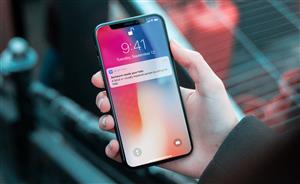
Smartphone app connecting visually impaired users in need with supportive volunteers
Be My Eyes, a Danish start-up company with headquarters in San Francisco, California, introduced a free app that connects blind and low-vision people with sighted volunteers. The app consists of a two-way audio and one-way video feed that allows the sighted volunteer to be the eyes of the blind user.
Be My Eyes, Be My Eyes, Denmark -
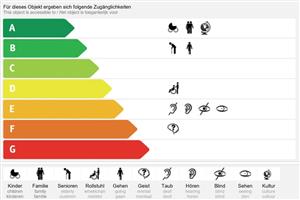
Rating the accessibility of buildings using a well-known seal system
BPASS carries out accessibility assessments of objects and public spaces based on a 300-question checklist for 11 different beneficiary groups. The actual state of the building or public space is visualised with a colour scheme and a rating. In addition to German, BPASS is also available other languages.
EUKOBA - European Competence Centre for Accessibility, BPASS, Germany -
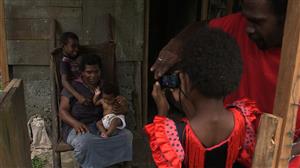
Giving a voice to children with disabilities
The project seeks to develop a simple and effective method for children with disabilities to express or communicate their life priorities and human rights issues. Therefore project team developed a set of inclusive tools to overcome barriers in verbal or oral communication and made these available on the project website.
Deakin University, Australia -
Low-cost technology for young people with vision impairment
This project offers various free services to the blind, including Inclusive Education, a higher education programme, and vocational and career training. It also develops low-tech teaching devices, such as drawing kits, flash cards, and apps that can be downloaded. In 2014, 262 children and juveniles participated in project activities.
Nhat Hong Center for The Blind and Visually Impaired, Vietnam -
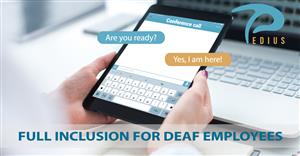
Accessible phone calls for the Deaf for private and professional needs
Pedius is a communication system that enables hearing impaired people to make telephone calls independently and at any time. Pedius Work Inclusion offers special features, such as subtitled conference calls. Founded in 2013, Pedius now has over 35,000 users in 13 countries and supports seven languages.
Pedius, Pedius Work Inclusion, Italy -
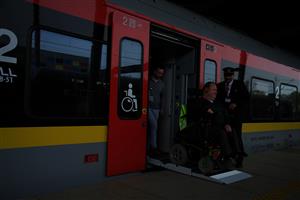
Regional railway company becoming accessible and a role model for the whole country
LKA, the railroad company of the Łódź region in Poland, launched a comprehensive accessibility programme, including online sign language interpreters and induction loops on trains. Other rail companies are following suit, and representatives of the LKA are involved in developing national guidelines.
Łódzka Kolej Aglomeracyjna, Railway accessibility in Łódź, Poland -
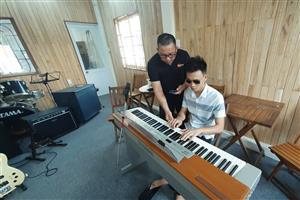
Blind programmers developing free software for blind users
In 2015 the Sao Mai Vocational & Assistive Technology Center for the Blind started developing software for blind users. By 2020 three products were released and are available free of charge: SM Braille, the Burmese TTS engine, and the SM Music Reader. The positive response is reflected in the increasing number of monthly downloads.
Sao Mai Center for the Blind, Vocational and Assistive Technology Center for the Blind, Vietnam -

A website offering instant captioning and translation
Streamer is a subscription-based website that captions speech to text in real-time and also offers an option to translate simultaneously into 117 languages. Streamer is suitable for use with speeches, conversations, classroom lectures, seminars, and webinars. Users can set up a private and secure Streamer website
SpeechGear, Streamer, United States of America -
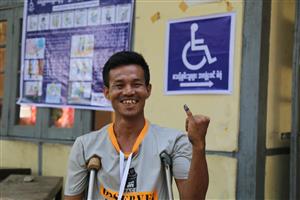
A step-by-step toolkit to monitor voter participation
IFES developed a methodology whereby people with disabilities and their organizations are trained as official observers and use checklists to collect data on access to the electoral process. As of 2018, 13 countries had employed the IFES’s methodology, resulting in the formation of a free-to-download Election Access Observation Toolkit.
IFES - International Foundation for Electoral Systems, Election Access Observation Toolkit, Indonesia -
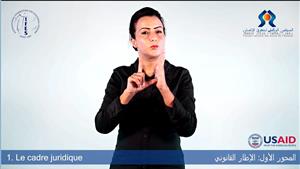
Capturing and distributing critical election-related sign language
With the "Electoral Sign Language Lexicon" IFES captures critical election-related sign language vocabulary. For explanation there are books, the Internet and an app. Train-the-trainer workshops are also available. Over 300 books have been distributed and the app has been downloaded more than 500 times.
IFES - International Foundation for Electoral Systems, Electoral Sign Language Lexicon, Libya
- Page 1
- Page 2
- Page 3
- Page 4
- Page 5
- Page 6
- Page 7
- Page 8
- Page 9
- Page 10
- Page 11
- Page 12
- Page 13
- Page 14
- Page 15
- Page 16
- Page 17
- Page 18
- Page 19
- Page 20
- Page 21
- Page 22
- Page 23
- Page 24
- Page 25
- Page 26
- Page 27
- Page 28
- Page 29
- Page 30
- Page 31
- Page 32
- Page 33
- Page 34
- Page 35
- Page 36
- Page 37
- Page 38
- Page 39
- Page 40
- Page 41
- Page 42
- Page 43
- Page 44
- Page 45
- Page 46
- Page 47
- Page 48
- Page 49
- Page 50
- Page 51
- Page 52
- Page 53
- Page 54
- Page 55
- Page 56
- Page 57
- Page 58
- Page 59
- Page 60
- Page 61
- Page 62
- Page 63
- Page 64
- Page 65
- Page 66
- Page 67
- Page 68
- Page 69
- Page 70
- Page 71
- Page 72
- Page 73
- Page 74
- Page 75
- Page 76
- Page 77
- Page 78
- Page 79
- Page 80
- Page 81
- Page 82
- Page 83
- Page 84
- Page 85
- Page 86
- Page 87
- Page 88
- Page 89